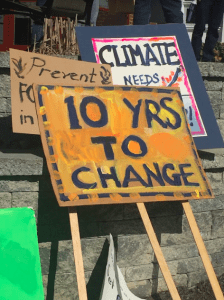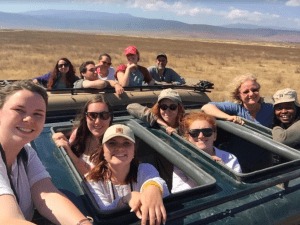Oct 10, 2019 | Exclusive |
Financial Literacy Column
Every year millions of students fail to file the free application providing them with the financial aid necessary to continue their college education. That free application is the FAFSA, and it’s mandatory that students who will be returning to school the following year file the application.
The financial aid provided by the FAFSA includes grants and work-study eligibility, in addition to federally subsidized and unsubsidized student loans.
Grants, like the Pell Grant, are free money, meaning the student does not have to pay it back after graduation. Federal Student Loans, like any loan, must be paid back. They are the only student loans with six-month grace period after graduation, while other loans require payments to be made right away, making repayment much more difficult.
As of Oct. 1, students are able to file the FAFSA for the 2020-21 school year. If a student files a FAFSA with the Educators before Nov. 1, they will be entered to win a cash prize.
Students can reach out to the UMF Financial Literacy Peer Education Program by emailing caleb.grover@maine.edu or DMing them on Instagram @umf_finlit.

Oct 10, 2019 | News |
Melissa Wood Contributing Writer
As plans for the new Sweatt-Winter building start to form, UMF is taking action for future and current students.
Director of Sweatt-Winter and children’s programs, Julie Farmer, speaks as to what she knows for the future plans. She said, “The building should be complete by spring of 2021.”
Farmer and her team on the building committee want to create more space. “We try and utilize the space here,” said Farmer, “but there is a need for a new building.”
This process has been a long one for the team. It started “a year ago this December,” she said, “it will definitely take another year.” They have no finalized blueprints yet as to what the inside or outside of the building will look like.
She expects more work-study students with the new building. “We have a hard time getting workers in here currently,” said Farmer, “It would definitely be nice to be in a building that offers a space for the students.”
She has been the director for three years now and was teacher 25 years prior to that.
Professor of Early Childhood Education (ECH) and Co-Chair of the building committee, Patti Bailie, is very excited about the new change for Sweatt-Winter. Her and the teams’ goal is to double the current size of their space from about 5,000 square feet to 10,000 square feet. “We want at least two classrooms for the Preschool,” said Bailie.
The committee is continuing to evaluate the potential for an infant and toddler room or playgroup. This building will offer a more flexible space for all classroom and staff to utilize.
“We want a large motor room that will definitely be a flexible space for everyone to use,” Bailie said. They have decided to add in a little bit bigger of a kitchen, so they are able to do cooking projects with the children.
When it comes to childrens art work they typically do it in the classroom, in a smaller space. “We want to add in an Art Studio for all classrooms to use,” said Bailie. This will help show off the children’s artwork in the center.

Located on 274 Front Street, the new Sweatt-Winter education building looks to be completed by the spring of 2021 (Photo courtesy of UMF Image)
Bailie and her team have decided to put different classrooms throughout the center. “We want a classroom for practicum students,” said Bailie, “We also would like to add a classroom for graduate studies.” They want more for the ECH students in terms of how they will learn. A classroom is in the works to become a space where the students can have a space to learn, but also double as a conference room for the faculty and staff.
The outdoor space is going to be naturalized said Bailie. “We want three seperate play areas,” she said, “we aren’t sure yet.”
“We want this center that is a model for Early Childhood Education,” said Bailie. They have plans for a parent space, better security, and a lounge space for students and staff.
They have had some good news when it comes to the process of the building. “The contractor has been hired,” said Bailie.
She also wants more student involvement. “I want all stakeholders involved with this project,” said Bailie. She knows how important it is to incorporate all the families and parents in the process, but also the students and staff. She has decided to get her ECH environment class involved in the making of the outdoor spaces for the children.
One student here at UMF, and parent of a child that goes to Sweatt-Winter, Natachia Lovering, spoke about her experiences with the center on campus. “They haven’t given an exact time as to when it will be done,” said Lovering, “it is really raising my curiosity.”
Knowing the amount of change happening to Sweatt-Winter she added, “The student perspective will be a positive change.”
She explains how the location of where the center is now and where it will be going is very helpful for her. “I have some travel barriers,” said Lovering.
When it came time for Lovering and her daughter to move to Farmington she knew she needed a daycare for her daughter. “The week before school started my daughter started at a different daycare,” said Lovering, “it was a 38 minute walk from my home.”
Then Lovering was surprised with some great news. “Julie called me and said they have an opening for us,” she said, “so far it has been a good experience.”
Lovering has already seen the change in her daughter after settling her in the new school environment. “In the beginning she didn’t have any relationships with people,” she said, “now she has established some great friendships.”
According to Bailie, the new building will be located at 274 Front street.

Oct 10, 2019 | Feature |
Kaitlynn Tarbox Contributing Writer
UMF students and members of the Sustainable Campus Coalition (SCC) gathered on the Mantor Green recently to gather support for the petition to fight climate change. A small group of students joined together on the Green to fight for something they are passionate about: climate change. Students placed their signs against the stone wall and music played loudly from the speakers on either side of it.
Aiden Saulnier, co-student leader of SCC, said in an email interview, “This strike felt hopeful, because many students joined us and we had tons of signatures.”
The SCC had close to 200 signatures from their strike and also from tabling outside of the dining hall. Saulnier said, “Besides signing our petition, and putting pressure on institutional power structures, students can make individual choices that are eco-friendly.”
Saulnier suggested methods of helping the environment can be buying clothing from a thrift store because “manufacturing new clothes creates a crazy carbon and water footprint.” People are also encouraged to use reusable water bottles, school supplies, and to reduce, reuse, and recycle. “When at the dining hall,” Saulnier said, “only take the food you can eat and always strive to me a #CleanPlateClub member.”

Signs made by the participants during the Climate Strike. (Photo courtesy of Kaitlynn Tarbox)
Lily Scribner, co-student leader of SCC, and other members were approaching students encouraging them to sign their petition to make campus more sustainable and to help fight climate change. She said, “One of the members of the SCC found music about climate change and sustainability, it was initially supposed to play until noon and then we were going to have people speak but the music drew more people inn and brought them to come learn more about what we were doing.”
Helping develop a community which is informed and passionate for similar causes is important to Scribner. “I think our strike can make a difference. They raise awareness for topics that most of the student body would not hear about otherwise, like our initiative to build a greenhouse on campus.” She said, “The more people that show support in changing things to better the climate and our campus, the more change we can bring into practice.”
Scribner encourages students if they want to help the environment to “write letters to their senators or town officials to enact policies, carpooling and taking shorter showers.” She said, “The biggest thing is just educating yourself on what you yourself can do to help you live more sustainably.”
Scribner found that even though UMF has recycling bins and options “so many recyclables are thrown into trash cans each day,” she said, “We could greatly decrease the amount of waste sent to the landfill if people took the time to properly sort their garbage.”
Climate strikes have been happening all over the country. Farmington’s was just a small strike that is apart of a much bigger movement that the SCC hopes will continue to push forward and make changes on campus and in our community.
For students interested in becoming involved with SCC, Saulnier clarified in a message to Flyer Staff, “. . .SCC is a coalition of UMF staff, faculty, student employees and volunteers (and not a club), we do not have an executive board. . .we are very much a cooperative organization in that everyone’s voice matters in our group.” Their office is located in the Student Center hallway, room 108, but they are currently meeting in the Ed Center room 113 on Mondays and Fridays during common time.

Oct 10, 2019 | News |
Derek Taber Contributing Writer
Nine students are set to embark on a journey to the nation of Tanzania in East Africa where they will learn the impacts of tourism on the local communities. Eco tourism is a form of travel that involves visiting areas of pristine countries, with the intention of conserving the environment, and minimizing the footprint of conventional travel.
Professors Linda Beck and Mark Pires are the two instructors leading the excursion in Jan. 2020. Together Beck and Pires are taking the students to Tanzania for thirteen days to ingratiate them with a set of principles that will help them understand the philosophies of ecotourism.
Learning the impact on the local economy while traveling is the main philosophy that Beck hopes to instill. “In the context of Tanzania, I want to help the students understand the tourists’ roll as consumers with the sustainability of our purchases,” said Beck. “One has to be really careful of how they spend their tourist dollars.”
Large tourist corporations will move into an area and exploit the local communities, adding pressure to the already limited supply of resources. Most tourism companies are owned by foreign investors and keep the profits in foreign markets. Companies will add infrastructure, and put a drain on environmental ecosystems by building roads, and supply lines to keep the tourist well stocked.

Photo captured from the Tanzania Trip held in 2016. (Photo courtesy of Linda Beck)
“People will go off-road on safari creating a havoc to the flora and fauna, but also amongst the animals,” said Beck. The money is kept in the deep pockets of the companies and does not get redistributed. “You want to make sure the dollars you spend actually go to the local economy,” said Beck.
Thomson Safari, a tour company based in Massachusetts that leads Tanzanian safaris, had a lawsuit filed against them in 2010 by the local communities after the denizens were forced from their land and blocked from a vital water supply. Thomson was building luxury safari camps.
“The exploitation of the environment, and the people is widespread,” said Beck.
Another goal on this winter trip is to meet with local environmentalist, and observe the local ecotourism operations. The group hopes to actually engage in ecotourism as well. Beck said, “When we hike Kilimanjaro, when we go on safari, when we visit coffee farms, all of those activities will be done in a sustainable manner.”
Nelson Peterson is a student who is going on the trip to Tanzania in December. Peterson has never been to Africa before and hopes to learn what ecotourism can do for communities around the world. “It will be nice to see how other people live in a different country,” said Peterson, who is excited to help with the Porters Association.
Helping bring water to dryer areas, and lug buckets over long paths to remote villages throughout the Serengeti is a special opportunity to him. “It will be really important to help the porters, part of our trip will be to help them [Porters association] bring water to places,” said Peterson.
The impact of learning the importance of environmentally responsible behavior while traveling is the most valuable takeaway from the journey to East Africa for Beck. “Watching the students get excited about Tanzania,” she said, “[and] learning how to become a global citizen,” is something that one can take with them forever.
Oct 10, 2019 | Sports |
Krystin Paine Contributing Writer
Intramural sports let students and many faculty members of UMF get exercise and have fun in an inclusive way. Intramurals consist of co-ed teams playing games like basketball, volleyball, kickball, flag football, indoor soccer and many others, including some water sports.
Jake Harris, senior and psychology major, has been doing these sports since his sophomore year. “I think there is definitely a need for intramural sports. My teams have always had a really enjoyable environment and being able to kick back and play mediocre volleyball is so fun for me,” he said. “We don’t win often, but that is the beauty of our team. We play to have fun rather than to win, so being able to keep a fun environment when losing is something not a lot of teams can do.”
Harris had only one minor drawback. “I don’t agree with allowing college level athletes to play intramurals. . .I wish there was a separate tier system for intramurals because it feels as if someone who doesn’t play basketball regularly won’t have a chance against the college athletes.”
Garrett Pooler, sophomore and rehabilitation major, is new to intramural sports, having only started playing this year. “I just got asked to play and thought why not do it. I knew nothing about the sport I was getting into but figured it would be a lot of fun,” he said. “I was definitely right as I’ve had a great time and have made a lot of new friends that I value deeply.”
Pooler felt his involvement with intramurals has had a positive impact on him. “I think intramural sports is one of the best things this campus offers. I know for myself I didn’t do them my freshman year and I wish I had. It gives me a reason to go out to see people I may not normally see or interact with. It also promotes exercise in a fun way than just running.”
David Blattstein, junior and community health major, agreed with both Pooler and Harris. “I find it is a positive reinforcer for meeting new people, getting physical exercise, and possibly sparking new interests.”
Blattstein transferred to UMF his sophomore year and felt welcomed by joining these teams. “This immediate new homebody of a friend group let me tag along with them into all their activities and daily events, which would lead me to join intramurals. It has given me something to look forward too,” he said.
“Especially on a very stressful day, knowing I’ll be with most of my friends makes the day much more bearable.” Blattstein believes that intramurals give the people of UMF a chance to challenge themselves and push out of a comfort zone they might not always get pushed out of. “Even if you’re not interested in sports, or have no desire to, I think everyone should try it at least once throughout their college experience.”
Intramural volleyball and soccer have two of the sports to take place in the Fitness and Recreation Center this past month. To sign up for an Intramural sport contact Leah Brackett at leah.brackett@maine.edu or go on their facebook page at https://www.facebook.com/ umfimsports/.


